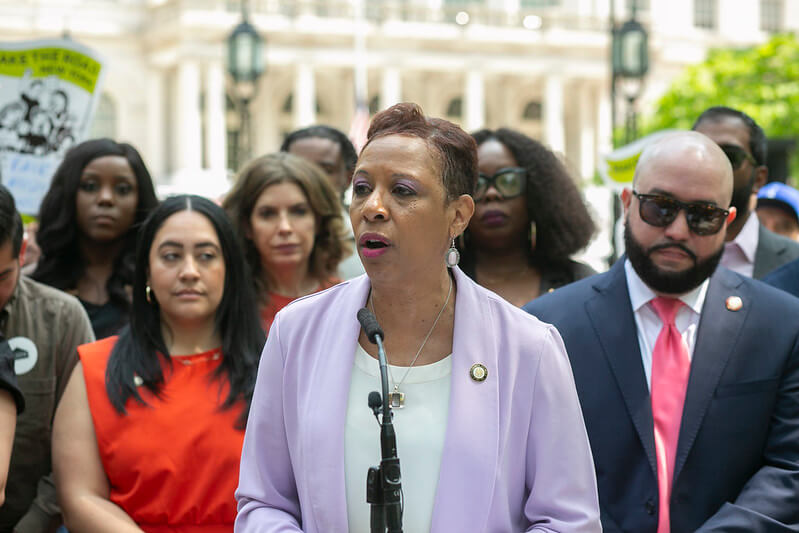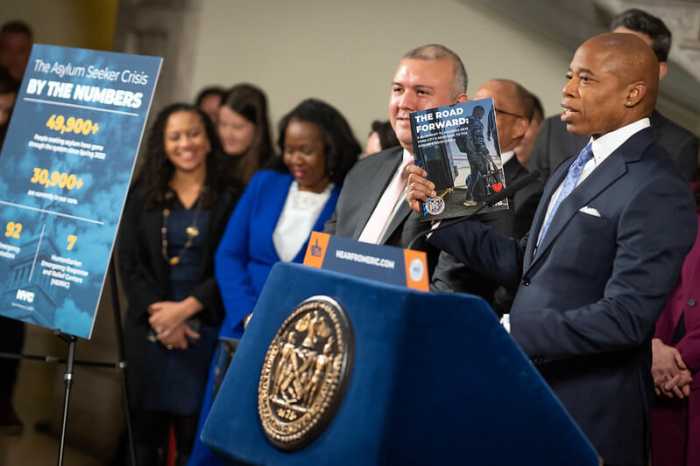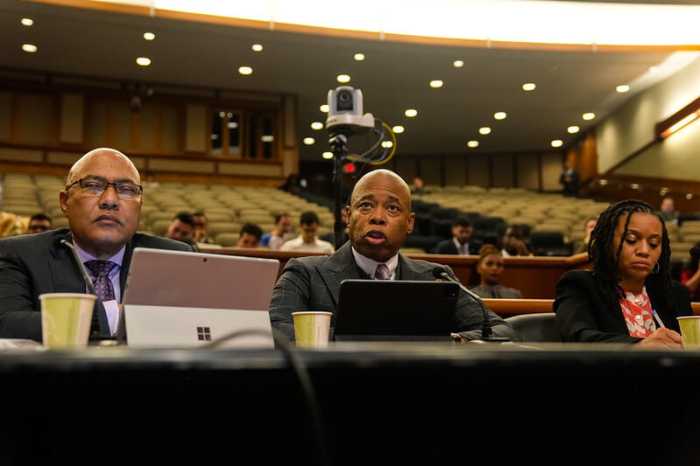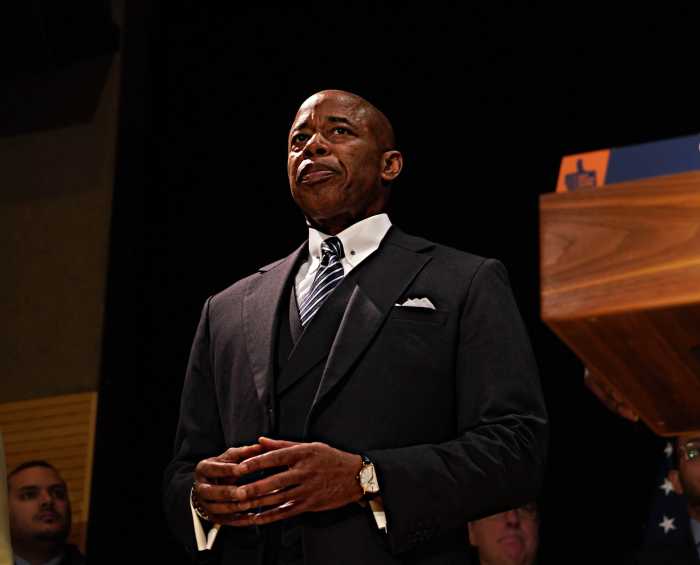Joining a growing chorus of critics of Mayor Eric Adams’ Wednesday night executive order to suspend parts of the city’s right-to-shelter law in anticipation of a potential migrant surge with the end of Title 42, City Council Speaker Adrienne Adams on Thursday called the action an “arbitrary and capricious suspension” of city law.
That’s the case, the speaker said, because the executive order pauses a local law that already gave City Hall the flexibility it’s seeking in housing potentially thousands more migrants a day in congregate settings. As long as they give public notice and confer with the City Council beforehand, the law allows the administration to house migrants in congregate shelters for up to 45 days.
The mayor’s action halts parts of the right-to-shelter law, which requires the city to find shelter for anyone seeking it.
“It seems like an arbitrary and capricious suspension of a local law, just to avoid communicating with the public and the council in advance,” the speaker said. “The suspension of local laws on the right to shelter removes protections for everyone in our city.”
Speaker Adams said the mayor’s actions surrounding the executive order are indicative of a larger “lack of coordination and collaboration” between his administration and the council in the response to over 61,000 mostly Latin American migrants who’ve arrived here since April 2022.
Those asylum seekers have overwhelmed the city’s shelter system and have led the administration to open 130 emergency shelters and eight so-called “humanitarian relief centers” to accommodate them.
She said the order also shows the city has “lacked focus” in its effort to transition people in homeless shelters into permanent housing, which would cost less than the considerable amount the city has been and anticipates spending on an emergency basis — $4.3 billion between this fiscal year and the next. The city’s Independent Budget Office, however, challenges that cost projection.
“The reality is that if the city doesn’t help move people out of shelters, then all we’re doing is growing our shelter system on an emergency basis,” Speaker Adams said. “That inevitably costs us more.”
Earlier in the day, at an unrelated press conference, Mayor Adams defended his decision to pass the executive order, arguing the city is mostly out of space for sheltering migrants and must temporarily alter the right to shelter law to give itself more flexibility in housing them.
“It was a challenging thing to do, but we’re doing the right thing. No one thought about a humanitarian crisis when they first took this court case of [the] right to shelter,” said the mayor, referring to the court case that established the city’s right-to-shelter law, which guarantees a bed to anyone seeking one.
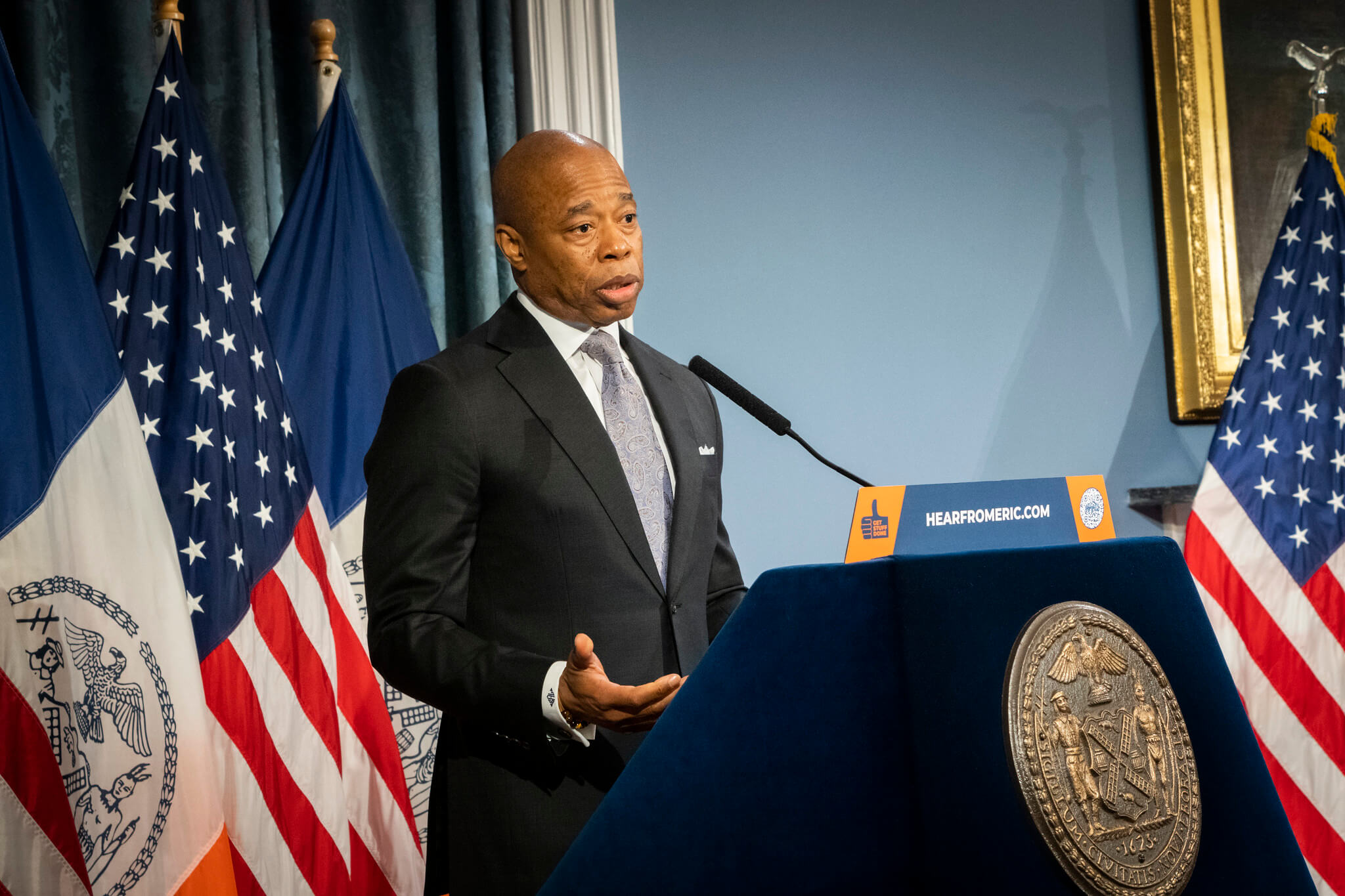
Even before the expiration of Title 42 — a public-health rule implemented during COVID-19 that restricts migration into the United States — Thursday, Mayor Adams said, the city’s capacity was at its limit. There are already 37,500 migrants in the city’s care and, hizzoner claimed, 4,200 who arrived in the Big Apple last week alone.
The executive order temporarily bypasses the requirement that the city find a placement for those seeking shelter within a given timeframe and that families with children be placed in individual units with access to kitchens and bathrooms — allowing the administration to house them in congregate settings.
In response to criticisms from the Legal Aid Society, among others, that children shouldn’t be placed in congregate facilities, Mayor Adams said that while “our desire isn’t to put families in dormitory settings,” it’s “unrealistic” to follow a rule that every family must have access to a bathroom and kitchen.
“That’s just not realistic, when you get 4,200 people in your city, that you’re going to find a place with a kitchen and a bathroom,” he said. “Our desire isn’t to put families in dormitory settings. Our desire is to manage a humanitarian crisis. And when you look at the law, what it was designed to do during that time had nothing to do with getting 4,200 people in a week.”
The mayor also took aim at unnamed progressives who have slammed his executive order, calling them “hypocritical.” He said while they’ve picked apart his approach to the migrant crisis, he hasn’t seen them join him in his trips into the subway system to speak with homeless individuals or a weekly food give-away for the homeless he often attends for a few minutes.
“Some of the loudest voices right now were MIA (missing in action),” he said. “When I’m in the subway system talking to people who are homeless trying to get them inside week after week after week, they’re just not there.”
But City Comptroller Brad Lander, while speaking to reporters on Thursday, said it’s still unclear how Title 42 will affect the numbers of asylum seekers coming to the city, so the mayor’s decision was premature.
“First, we just don’t actually know how many folks are gonna come,” Lander said. “And to rollback critical shelter safety protections without actually seeing how many people are coming, I think opens up the possibility of harm without the evidence that you needed to do it.”



